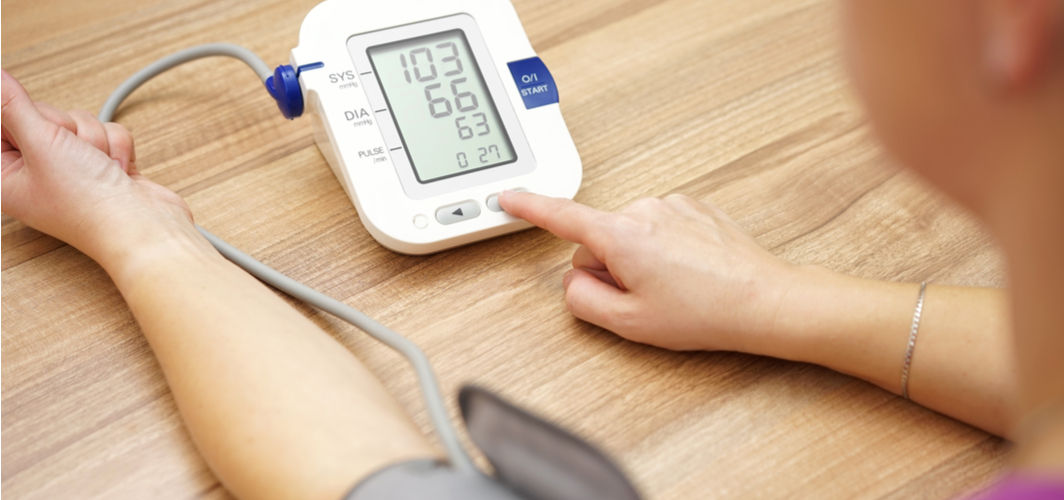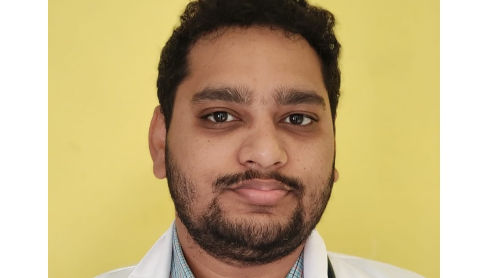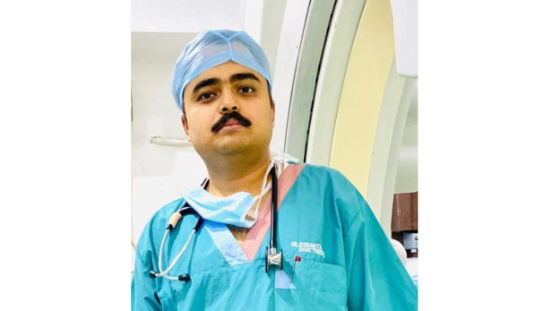Heart Conditions
Keeping Hypertension in Check: Tips and Treatments
7 min read
By Apollo 24|7,Reviewed by Dr. Srividya Kalavagunta, Verified by Dr. Divya Chandrasekharan, Published on - 13 August 2024
Share this article
0
0 like
.jpg?tr=q-80)
High blood pressure, also called hypertension, happens when the blood pushes too hard against the walls of your arteries. Arteries are the blood vessels that carry blood from your heart to the rest of your body. Hypertension forces your heart to work harder to pump blood and can cause your arteries to become narrow or stiff.
Blood pressure less than 120/80 mmHg is considered healthy. One can control blood pressure by altering one's lifestyle and, if required, taking medication. Your doctor will work with you to create a strategy to get your blood pressure down to an average level.
The American Heart Association categorizes blood pressure into four stages:
- Normal:
Systolic pressure: less than 120 mmHg
Diastolic pressure: less than 80 mmHg - Elevated:
Systolic pressure: 120-129 mmHg
Diastolic pressure: less than 80 mmHg - High Blood Pressure (Stage 1):
Systolic pressure: 130-139 mmHg
Diastolic pressure: 80-89 mmHg - High Blood Pressure (Stage 2):
Systolic pressure: 140 mmHg or higher
Diastolic pressure: 90 mmHg or higher
General Management of Hypertension
In addition to taking your prescribed medications, treating your hypertension requires making lifestyle changes such as eating a nutritious diet, consuming less sodium, exercising frequently, managing stress, giving up smoking, and consuming less alcohol.
What is a successful hypertension management plan?
The International Society of Hypertension recommends controlling blood pressure to less than 130/80 mmHg for adults with hypertension, which is a successful hypertension management plan. You should also regularly monitor your blood pressure and adhere to your treatment plan.
Can hypertension be cured?
While there's no cure for primary hypertension, secondary hypertension caused by underlying conditions can be cured by treatments. Hypertension can be managed and controlled with lifestyle changes, medication, or a combination of both for long-term care.
When should you see a physician to control your blood pressure?
If you experience symptoms like headaches or chest pain, abrupt fluctuations in blood pressure, uncontrolled high blood pressure, or underlying medical concerns, you should see a doctor right away.
How to check blood pressure?
Before checking your blood pressure:
- Remember to empty your bladder and avoid smoking, caffeine, or exercising 30 minutes before.
- If checking at home, sit with a straight back and supported feet flat on the floor.
- Support your arm at heart level on a flat surface, take two or three readings one minute apart, and record the results.
Follow your doctor’s instructions and take regular check-ups for professional guidance and ongoing monitoring.
Lifestyle management of Hypertension
Lifestyle modifications are advised for all patients with high blood pressure or hypertension; however, not all patients diagnosed with this condition require pharmacologic therapy (medications). Lifestyle changes such as losing weight, eating a healthy diet, regular exercise, quitting smoking, and limiting alcohol intake can significantly improve your blood pressure and overall health.
Nutrition
Generally, a diet high in fibre and low in added sugar, fat, and salt (sodium) is recommended for patients with hypertension.
Cutting back on salt intake can lower blood pressure in both high and elevated blood pressure people. Additionally, it can enhance blood pressure drugs and assist in avoiding excessive blood pressure.
Dietary Approaches to Stop Hypertension, or DASH diet, is one example of a healthy eating plan.
Here's how to follow it:
- Eat plenty of fresh fruits and vegetables to fill half your plate at each meal.
- Fill about a quarter of your plate with whole grains, such as whole-wheat pasta, brown rice, or whole-grain bread.
- Opt for low-fat dairy products.
- Avoid fatty cuts of meat, processed or cured meats, and poultry with skin. Instead, fill about a quarter of your plate with lean proteins such as fish, chicken without skin, beans, eggs, and tofu.
- Avoid premade and processed foods with higher sodium, added sugar, and fat.
- Reduce your daily sodium intake, aiming for less than 1,500 mg if you have hypertension.
Exercise
- Engage in at least 30 minutes of aerobic exercise, such as walking, swimming, or biking, on most days of the week.
- Include muscle-strengthening exercises, like weight lifting, into your weekly routine for at least 30 minutes on at least three days a week.
- Consult with your doctor or activity coach to establish an appropriate body weight and work towards achieving it.
Others
- Identify sources of stress and implement stress management techniques, such as meditation, deep breathing, and engaging in enjoyable activities.
- Refrain from smoking cigarettes, chewing tobacco, or e-cigarettes.
- Control any long-term (chronic) conditions affecting your blood pressure, such as high cholesterol or diabetes.
Along with these lifestyle changes, you must consult your doctor regularly.
Medical Treatment of Hypertension
Taking medication to manage your blood pressure is essential if lifestyle changes aren't enough to control it. To ensure the effectiveness of your medicines, take them exactly as your doctor has instructed and follow the directions carefully.
Common medications to lower blood pressure
Diuretics, beta-blockers, ACE inhibitors, ARBs, and calcium channel blockers are common medications for lowering blood pressure. Take your medicines at the prescribed times and dosage, discuss any concerns or side effects with your doctor, and do not discontinue medication alone.
Make sure to take your hypertension medication precisely as your doctor tells you, at the same time every day, to keep your blood pressure under control. Skipping doses can be risky and might make the medication less effective, leading to complications like heart attack, stroke, kidney disease.
Treatment for Different Types of Hypertension
- Primary hypertension treatment
For patients with essential (primary) hypertension, doctors usually start treatment with antihypertensive drugs along with lifestyle change advice.
Therapy can begin with one drug (monotherapy) or two drugs (combination therapy), preferably in a single pill to improve adherence. - Secondary hypertension treatment
Secondary hypertension can be caused by underlying conditions, such as kidney or cardiac problems or sleep apnea. Therefore, treatment should focus on addressing the root cause.
The doctor will evaluate, identify, and treat secondary causes and provide medications to reverse those conditions to lower blood pressure. - Resistant hypertension treatment
When someone has resistant hypertension, it means their blood pressure stays too high even though they are taking the highest dose of three different types of blood pressure medication, including a diuretic (water pill).
Resistant hypertension requires a personalised approach. It involves finding and treating reversible causes and stopping medications that raise blood pressure. - Hypertensive emergency or urgencies
Severe hypertension in adults (i.e., ≥180/≥120 mmHg) can be associated with a variety of acute, life-threatening complications, any one of which is considered a hypertensive emergency.
In a hypertensive emergency, quick medical intervention is crucial to lower blood pressure and prevent organ damage safely. Suppose blood pressure is lowered too rapidly or to a level below the body's ability to maintain adequate tissue perfusion; there is a risk of adverse events (e.g., stroke or heart attack). - Renal hypertension treatment
When the arteries to the kidneys narrow, less blood reaches the kidneys. This condition is called renal artery stenosis. In response, the kidneys release a hormone that raises blood pressure, known as renal hypertension.
This condition requires treatments like medication, angioplasty, stenting, or surgery on kidney blood vessels. Consult a nephrologist for the most suitable approach. - Pulmonary hypertension treatment
Pulmonary hypertension is a kind of high blood pressure that affects the arteries in the lungs and the right side of the heart. It has many different causes and is typically a complication of heart disease or lung disease.
This condition is primarily managed with medications, oxygen therapy, and lifestyle changes. Consulting and being closely monitored by a pulmonologist or cardiologist is essential for effective treatment. - White coat hypertension treatment
White-coat hypertension is caused by anxiety at doctor visits. The doctor will ask you to monitor your blood pressure at home and consult with those readings for guidance.
Doctors consider using 24-hour ambulatory hypertension monitoring to rule out the masked effect and then treat it with lifestyle changes, relaxation techniques, and possibly medication.
Conclusion
Always remember to modify your lifestyle to control high blood pressure. Eat well, reduce salt in your diet, exercise frequently, keep a healthy weight, manage stress, cut smoking, drink alcohol sparingly, and take prescribed medications as directed by your doctor. Get regular checkups with your physician for efficient care. Regularly check your blood pressure at home and consult your doctor for follow-up. It's critical to regulate high blood pressure to prevent significant problems, including heart attack, stroke, heart failure, kidney disease, and visual issues. To safeguard your health, lead a healthy lifestyle and use prescription drugs as directed.
Apollo 24|7 provides complete monitoring and management of your disease by offering lab testing and medical consultations to individuals seeking professional help.
Services
Heart Conditions
Consult Top Cardiologists
View AllLeave Comment
Services
Recommended for you

Heart Conditions
The Coffee & Heart Connection: Is It Good or Bad?
There may be numerous benefits of drinking coffee but like everything else, it too comes with some side effects and risks. This article highlights the benefits and side effects of coffee on your heart.

Heart Conditions
Alcohol & Heart Health: How Much is Safe to Drink?
Excessive consumption of alcohol is associated with an increased risk of high blood pressure, heart failure, stroke and other complications.

Heart Conditions
Why You Should Regularly Check Your Blood Pressure at Home
Both high and low blood pressure can be extremely dangerous and can result in serious health consequences. Therefore, it is crucial to monitor blood pressure frequently.
Subscribe
Sign up for our free Health Library Daily Newsletter
Get doctor-approved health tips, news, and more.
Visual Stories

7 Tips to Manage Hypertension
Tap to continue exploring
Recommended for you

Heart Conditions
The Coffee & Heart Connection: Is It Good or Bad?
There may be numerous benefits of drinking coffee but like everything else, it too comes with some side effects and risks. This article highlights the benefits and side effects of coffee on your heart.

Heart Conditions
Alcohol & Heart Health: How Much is Safe to Drink?
Excessive consumption of alcohol is associated with an increased risk of high blood pressure, heart failure, stroke and other complications.

Heart Conditions
Why You Should Regularly Check Your Blood Pressure at Home
Both high and low blood pressure can be extremely dangerous and can result in serious health consequences. Therefore, it is crucial to monitor blood pressure frequently.


